Beth Kephart's Blog, page 22
April 26, 2016
In which we say goodbye with a song. Cole Bauer's song. Listen.
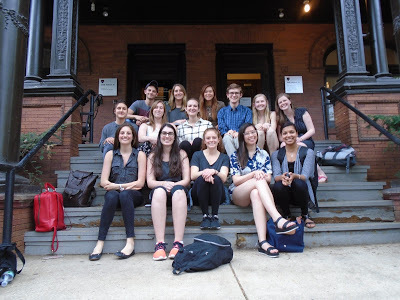 And so—reading of each other, to each other—we said goodbye today at Penn. These are my mighty fourteen who dared to take on the memoir beast...and won. The mighty fourteen who provoked my tears—and allowed me to cry them.
And so—reading of each other, to each other—we said goodbye today at Penn. These are my mighty fourteen who dared to take on the memoir beast...and won. The mighty fourteen who provoked my tears—and allowed me to cry them.And that, above, is Cole Bauer, our Mr. Music Man, whose guitar work accompanied the gorgeous Beltran audio recording on home. Cole is a singer-songwriter who packs in the crowds at a local bar on Monday nights. Cole is the guy who wrote, throughout our time together, with hope-restoring heart. It's uber cool to love those who love you. Cole reminded us of that every time we met.
Listen.
Then go ahead and buy your copy of "Small Town," here.




Published on April 26, 2016 15:18
April 25, 2016
Juncture Notes 02—soon on its way
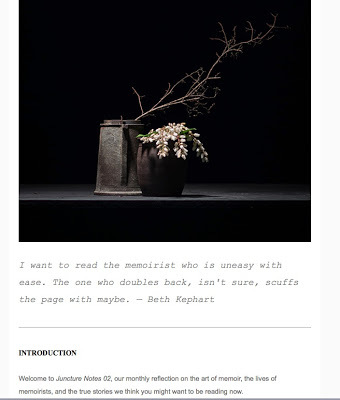 We'll be releasing Juncture Notes 02 shortly. Talk about memoir, the lives of memoirists, and the stories we think you'll love—all mixed in with my husband's ceramics/photographic artistry.
We'll be releasing Juncture Notes 02 shortly. Talk about memoir, the lives of memoirists, and the stories we think you'll love—all mixed in with my husband's ceramics/photographic artistry.If you're interested in receiving a copy, sign up through the Juncture Workshops site, here on the blog, to the left.




Published on April 25, 2016 14:38
and now introducing Nina Friend, foodie and spellbinder
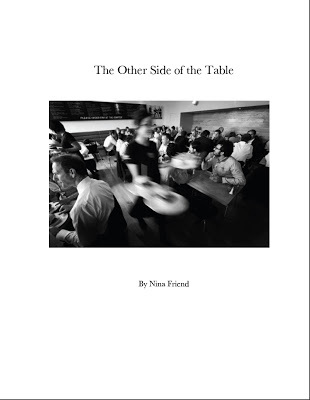
Photo Credit
It's an increasingly interesting thing—this writer/teacher role I play. I've been at it long enough to note the shifts in student needs and expectations, to be able to predict, better than I once could, what books, passages, and lines will inspire, which exercises will illuminate and which will stress, which days will quiver with hope, and which with longing.
But I can never summon, in the my mind's eye, the particular students who will find our classroom at 3808 Walnut on Tuesdays each spring. I can never predict the stretch of soul and commitment. When I first met Nina Friend last year, I saw beauty and height, enormous kindness and care, a young writer who could certainly place a sentence (or several, more) on the page, that generous type who shared her mother's cookies and who always offered more.
When Nina set out to write her honors thesis with me this year, we both knew that food would be involved, as well as Nina's passionate interest in the lives of those who serve. Over the course of many months, Nina went from restaurant to restaurant, from book to meeting, from interviews with famous people to serving herself. She wanted to see, as she writes in her thesis, beyond the performance. She wanted to know who was happy as they served—and when and why. She asked whether "serving others can coexist with serving oneself."
A supreme perfectionist, a writer who deeply cares, a young woman who asked for more and more critique—and who absorbed it, faithfully, returning each time with a thesis of ever greater grace and magnitude, Nina has gone behind the lines in her thesis—a work that will change its readers and remind them always (a perpetual nudge) to look harder at the person announcing the day's specials.
Nina, like David Marchino, whose thesis is featured here, has given me permission to share some of her work with you. I'm scurrying out of the way so that you can meet Nina and her cast of characters yourself. This is from the chapter called "Community."
Community
Crisp and golden, it’s propped in the middle of a silver platter that’s been in the family forever. A heap of crumbled bread forms a moat around the centerpiece. Stuck together with orange juice, flavored with parsley. The first cut slices the bird on its side. Succulent. Soft. A ladle filled with gravy. A spoonful of stuffing. Two helpings of pecan pie. Chocolate mousse. Whipped cream.
* * *
When Ellen Yin opened Fork Restaurant eighteen years ago, she wanted the
space to feel familial. The mosaic floor was laid down by a neighborhood tile guy. A local ironworker made the chandeliers. A fabric designer in the area crafted lampshades. Tony DeMelas says the restaurant instantly became “a community of artists and love.”
When Yin decided to revamp the restaurant in 2012, she called up Tony to create
a mural. Something to hang over the brown velvet couch that stretches across an entire
side of the restaurant. Tony was honored to be able to create something for the restaurant
he worked in.
When Tony was working on the mural, Chef Eli Kulp would drop by his studio.
Just to keep him company. Just to be there. “He was very hands-on,” Tony says. Kulp
was the only chef that has ever influenced Tony’s work. He was infatuated with the way
Kulp composed his plates. The way he could make a rib look like a log in the woods with
flowers blooming out of it and mushrooms growing from tiny cracks. His food was
sculpturesque. Tony says, “I’d look at [Eli’s plates] and go, ‘[If] you just blew this up and
abstracted it…and put it on a canvas, you could sell the hell out of this thing.’”
Tony’s mural hangs above the extra-long couch and reflects its color onto the
dark wood tables. Yellows and oranges and light greens and white and brown. A forest of
tree trunks, abstracted.
Tony used to walk past the painting hundreds of times every day as he hustled
from Fork’s kitchen to his tables, balancing plates in his arms. Customers would come in
and sit down and admire the mural. They would say things like, “Oh, it’s so much bigger
than in the pictures!” They would be waited on by Tony – with his square, tortoise-shell
glasses and eyes that feel like he’s staring into your soul – and they would have no idea
that the humble man taking their orders was the artist who painted that masterpiece.
* * *
Community can be built into a place. But it’s the people within that place who
decide whether community flourishes or dies.




Published on April 25, 2016 08:36
April 24, 2016
introducing David Marchino, a writer fully formed
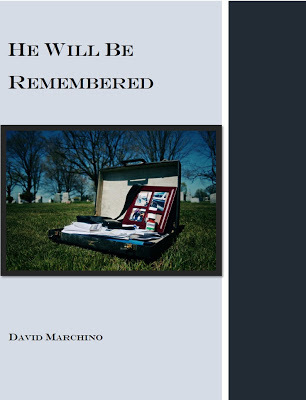 You have heard me speak of my two honors thesis students. Tuesdays we'd meet. Through the week we'd talk or write. Sometimes I'd see pages. Sometimes I'd wait for pages. Always I was here and they, my students, were where they had to be: sifting, thinking, wording, revising, making the story what it had to be.
You have heard me speak of my two honors thesis students. Tuesdays we'd meet. Through the week we'd talk or write. Sometimes I'd see pages. Sometimes I'd wait for pages. Always I was here and they, my students, were where they had to be: sifting, thinking, wording, revising, making the story what it had to be.David Marchino, the guy who taught me jawn and green hair, bamboo and patience, the healing power of a boyhood friendship, taught me even more than that with his memoir, He Will be Remembered: A Father's Crowded Life. In these tight, proud, poeming pages, David recalls the father he loved, lost, and recovered, if only for now. The cemeteries where the dead appease the living. The religion of his parents' cocaine. The power of a recovered briefcase. The voices of plead and promise. David speaks through namesakes. He tunnels through memory. He comes out the other side, burnishing truth with myth—the opposite, too.
David has given me permission to share the opening pages of his memoir with you. I do that here, with deepest respect for the journey David has taken and the words he has produced. With the greatest possible sense of honor that he allowed me to stand on the sidelines and cheer him on.
David Marchino. Writer. True.
From the (near) beginning:
He is not hard to find. He may arrive when you speak his name, or when you curse it. A magician whose default state is disappeared. His greatest trick is presence. My father—eight years gone—now back. Ta-da.Tomorrow, the work of Nina Friend.
He looks worn, like he’s spent the last few years disappeared in a pothole. Like his body has finally exhausted its last expanses of youth. The man is tired. His arms, his legs, his skin. He’d been virile once, you could tell. I remembered how the skin tightened around his biceps, how he’d make the panther on his arm roar. He’d always been a little slight—not more than five-and-a-half feet—but now he looks unsteady.
“Hello, Sonny,” and I am fourteen again: his grip on the back of my neck, his prickly lip on mine. Love that said I have you.
When he hugs me, I want to say I feel that slip away. His blustery love, the years gone. But I only feel in my arms a man who has stagnated, and he, in his, a son he no longer knows.
He sits me on his couch. He lies to me. He paces the floor and sips beer after beer. “Only four a day now,” he says as his eyes grow rheumy and soft. Hustling is still a part of his to day-to-day, only now there is safety. He is a supplier, never out on the streets for more than fifteen minutes and raking in more cash than he’s ever seen. I don’t doubt this. For the past eight years, I’ve had no significant contact with my father, but he came sporadically every now and again. A phone call at two in the morning, a wet whiskey-rasped voice. The few times I heard my father cry. It was desperation. He’d been dealing and had cut someone short. Word got around. They’d put the gun in his mouth. They’d hit him with a bat. The shapeless, omnipotent they were on the hunt for him. He was going to die.
I’d cry with him during these calls—I’m not sure a son can do anything else in that situation. But, when he hung up and I was left with just the dial tone, I felt sure Dad would be okay. He wrote the story of his life, circumstances be damned. My father was legend, was myth, was Roman God. As long as someone believed in him, he could never be lost.
He asks about a lot, never sitting down with me. It’s as much interrogation as it is plea. Questions are fired off with no space given to answer them. They are formalities more than anything else. He does not want my answers. He prefers his own. He reads our reunion as permission to rewrite the past, prune the truth to his liking. It is the hand that gripped my neck as a child and directed me, as though it clutched the handles of a bicycle. It reaches out for the past eight years of my life.
It’s desperation, I realize. We fear the unknown—the late-night creaks that resound from the basement as we try to sink into bed, the voices we are certain we hear calling our name as we make our way through a soulless alley. That is true fear: incalculable, unreadable. As my father looks into my eyes after all these years, he sees it in me. I am a void wrapped in his orange-ish, freckled skin. I come to him a changeling, a severed connection he is frantically trying to reestablish. We fictionalize what we do not know—an admission of ignorance and an appeal for enlightenment. A construction meant to give shape to the unknown. The gentle blue of the sky draped over the endless, infinite, abyss of space. To fit my life into some predetermined mold is, for my father, a means to close the gap between us. He pretends to know his son. It is easier that way....




Published on April 24, 2016 14:44
the art of Juncture Notes (issue 2 will soon be on its way)
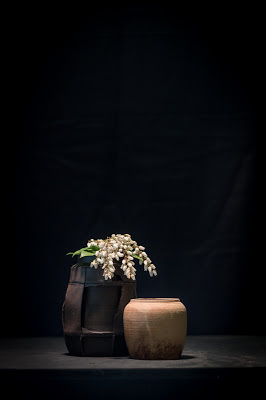 We've been so thrilled by the response to Juncture Notes—the writing elicited by our prompt, the questions about memoir, the interest in our five-day memoir workshop. We're now at work on our second release, which should go out in a week or so. If you're interested in receiving a copy, just click on the link to the left of this blog post (or on the workshop link above). That's the sure-fire way of beating the spam filters, or so we believe, anyway.
We've been so thrilled by the response to Juncture Notes—the writing elicited by our prompt, the questions about memoir, the interest in our five-day memoir workshop. We're now at work on our second release, which should go out in a week or so. If you're interested in receiving a copy, just click on the link to the left of this blog post (or on the workshop link above). That's the sure-fire way of beating the spam filters, or so we believe, anyway.One of the questions we've been receiving relates to the art that is folded in with the words. That art is, as many of you have guessed, the work of my partner in life and in this Juncture enterprise, William Sulit. I've shared his work in many media from time to time on my blog. Bill's work was recently selected for the prestigious Clay Studio National exhibit, beginning on May 6th. We'll soon be celebrating his first solo show—in ceramics—at Show of Hands Gallery in Philadelphia, beginning on June 3 and ending July 24.
Bill will be creating or sharing original art in each issue of Juncture. Here, above, is a taste of things to come.
Sign up if you'd like to see (or read) more.
There are just four spaces now left at our inaugural memoir workshop. Please let us know if you are interested.




Published on April 24, 2016 04:34
April 23, 2016
Joan Wickersham in person, Kelly Writers House as refuge
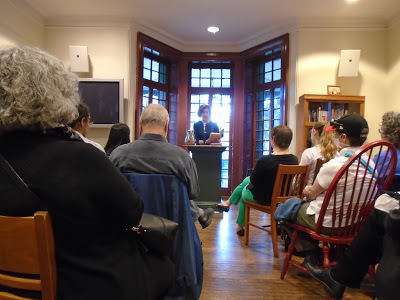 I would have preferred a sharper photo. I could blame my fatigue at the near end of that day—my hands slipping, or my eyes watering, or something. Instead, I'll declare this photograph of Joan Wickersham reading at Penn's Kelly Writers House to be infused by the light Joan carries with her. As she works. As she reads. As she considers. As she listens.
I would have preferred a sharper photo. I could blame my fatigue at the near end of that day—my hands slipping, or my eyes watering, or something. Instead, I'll declare this photograph of Joan Wickersham reading at Penn's Kelly Writers House to be infused by the light Joan carries with her. As she works. As she reads. As she considers. As she listens.Joan was at Penn to read from three works—nonfiction ( The Suicide Index ), fiction ( The News from Spain ), and poetry (Vasa Pieces, parts of which appear in Agni 82). Her coming was, for me, a highlight of this semester—a chance to hear from a writer whose work has long inspired and thrilled me. A chance, too, thanks to Joan's invitation, to spend an hour or so alone with her over steeping, seeping cups of berry tea. We talked advertising youths, Lab Girl, place in memoir, the confounding role of adjunct teachers, Philadelphia then and now. I discovered, in Joan, that rare, wonderful thing: a person as gloriously complex and broadly thinking in person as she is on the page.
And then there she was, reading. Words I'd read twice, sometimes three times before, but delivered newly. A culminating sequence from Vasa Pieces—new work inspired by the sinking and resurrection of the Swedish warship, Vasa. Beautiful pieces made thrilling by their emergence from history and their threads of urgent now. The first poem setting the tone, revealing the "must" of this work—the role the Vasa played in the imagination of Joan's husband:
... I imagine you down there,Poems continuing on through ships (and lives) gone wrong, through autobiographies redesigned by survivors, through shipworms and felt absence.
reading and re-reading the story of Vasa,
memorizing every picture, puzzling over the order—
the heeling ship, the sinking ship, the risen ship,
the sunken ship, the battered risen ship again—
clinging to the table leg, pretending it was a mast.
Until Joan lifted her head. And even then, her spell was not broken. The light still broke behind and through her.
I want to thank my students who attended for allowing this moment into their lives. I want to thank Jamie-Lee Josselyn, that lovely vision in green pants, for her beautiful introduction. I want to thank the Kelly Writers House for being home and hearth to both talent and soul, for being that place that students can and do turn to when the world feels raw and bright minds are the cure.
I want to thank Joan for the afternoon, and for the inspiration of her commitment to the work itself. The work, above and beyond all else.




Published on April 23, 2016 03:36
April 22, 2016
LAB GIRL: my thoughts in the Chicago Tribune
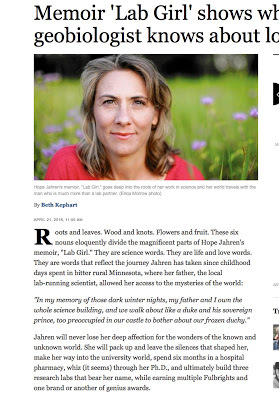 This coming September, on an old farm in McClure, PA, a group of very-wow writers will be sitting at a big old table in a fabulously idiosyncratic barn talking about Hope Jahren's Lab Girl to kick off Juncture's inaugural memoir workshop.
This coming September, on an old farm in McClure, PA, a group of very-wow writers will be sitting at a big old table in a fabulously idiosyncratic barn talking about Hope Jahren's Lab Girl to kick off Juncture's inaugural memoir workshop.My thoughts about this near-perfect memoir are here today , in the Chicago Tribune.
There are just four spaces now left in our workshop. If you're interested in the workshop or in the newsletter, please click on this link and let us know.




Published on April 22, 2016 04:02
April 17, 2016
the moving spectacle of nonfiction, in Phillip Lopate's words, as the semester nears its end
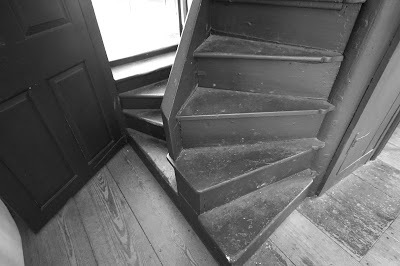 This past Wednesday afternoon and evening I had the distinct pleasure of spending time in the company of the great essayist and Columbia University professor (and head of the graduate nonfiction program), Phillip Lopate, his wife, his daughter, and members of the Bryn Mawr University creative writing program.
This past Wednesday afternoon and evening I had the distinct pleasure of spending time in the company of the great essayist and Columbia University professor (and head of the graduate nonfiction program), Phillip Lopate, his wife, his daughter, and members of the Bryn Mawr University creative writing program.(Thank you, Cyndi Reeves and Daniel Torday, for allowing me to crash the party.)
Between the cracks of many deadlines here, I've been reading from the books I bought that evening. I have, of course, read Lopate through the years; who can teach nonfiction without owning Lopate volumes? But I did not own, until this Wednesday night, To Show and To Tell: The Craft of Literary Nonfiction, which is, in a word, a glory. Perhaps it is because I agree so steadily with Lopate's many helpful assertions, perhaps it is because I, in my own way, attempt to teach and, in books like Handling the Truth: On the Writing of Memoir, carry forward these ideals about the rounded I, the obligation to the universal, the curious mind, the trace-able pursuit of questions, that I sometimes read with tears in my eyes passages like this one, from "Reflection and Retrospection: A Pedagogic Mystery Story:"
In attempting any autobiographical prose, the writer knows what has happened—that is the great relief, one is given the story to begin with—but not necessarily what to make of it. It is like being handed a text in cuneiform: you have to translate, at first awkwardly, inexpertly, slowly, and uncertainly. To think on the page, retrospectively or otherwise, is, in the last analysis, difficult. But the writer's struggle to master that which initially may appear too hard to do, that which only the dead and the great seem to have pulled off with ease, is a moving spectacle in itself, and well worth the undertaking.There are just two more weeks left in this semester at Penn. My beautiful honors thesis students are finalizing their work and, soon, will not just hold their glorious books in their hands, but have the time to reflect back on all the lessons learned. My Creative Nonfiction students are writing letters, Coates and Parker and Rilke style, to those they feel must hear them, while also working on 600-word portraits of one another. Joan Wickersham, the extraordinary writer of both nonfiction and fiction is headed to our campus, Tuesday evening, 6 PM, Kelly Writers House—and if you are anywhere near, I strongly suggest you make the time. She is a national treasure.
Teaching is exhausting, exhilarating, necessary, confounding, essential. I learn that again, year upon year. I stagger away—made smarter, in so many ways, by the students I teach.




Published on April 17, 2016 06:53
April 13, 2016
sometimes you don't need to throw a launch party; the party is the day itself
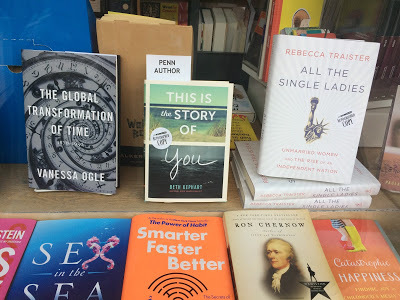 Yesterday:
Yesterday:Early morning, opening this outrageously wonderful gift from Taylor Norman (Chronicle Books), in celebration of the launch of This Is the Story of You.
A 20-minute walk in the rain to the delayed train.
Train time spent with Diana Abu-Jaber's Life Without a Recipe, a very beautiful memoir launching from my first editor and house, Alane Mason, W.W. Norton, this month.
A walk in the lessening drizzle to Penn where, on my way to a meeting, I discovered Story in the front window of Penn Book Center, where I'll be joining my Jensen friends (Cordelia and Melissa) for a Saturday afternoon reading and discussion on June 4th.
A conversation with my teaching and writing colleague, that very same Melissa Jensen. "Pure sunshine," one of my students said of her, and oh she is.
The privilege of watching my students conduct a conversation about Between the World and Me . One by one, they wrestled with the readers' guide questions I'd prepared, felt free to disagree, voiced their opinions with precision—and deep respect. A discussion unbounded—content and craft.
The moment when I read out loud from Dear Mr. You, Mary-Louise Parker's collection of letters to the men in her life. The students had read "Dear Daddy." I shared, then, this, from "Dear Oyster Picker." Parker's father has been given little time to live. Parker is standing in a bookstore, on the phone with her dad, wanting to be all right, not being all right. These are the final words of this essay, and the book:
I said well, okay, I'm standing in this really awesome bookstore. You'd love it, I said. He gave a sigh of longing and said, oh my, tell me, they have anything interesting? I said yeah, tons. I'll send you a book from here, how does that sound. He said that's wonderful, that's just tremendous, thank you sweetie. I told him I was sending him some candy too and he thanked me, said he'd be on the lookout for it, and he then said, tell me, what are you writing now? You working on anything? I said oh Daddy, just little things, I don't know, and he said okay, but listen to meThe walk back to the train in brightest sunshine. The train ride home with the gloriously multi-gonzo talented Lorene Cary. The deliberately lengthened walk from train to home so that I might talk, as I love to talk, with Debbie Levy.
just write, keep writing, promise me that you will.
The infusion of unforeseen support and hope and kindness on Twitter, on Facebook, on email, regarding the launch of Story. Thank you.
A dinner with my husband, where we lifted our glasses to sea and storm and, then, sun.
A call from Danielle.
Sometimes you don't have to throw a party for a book. The party is simply all bound up in the day that you have lived.
Thank you, universe.
Just write, keep writing




Published on April 13, 2016 03:50
April 12, 2016
a gift of gifts, on book launch day, from Taylor Norman of Chronicle
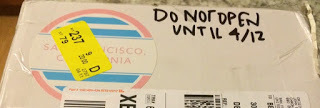
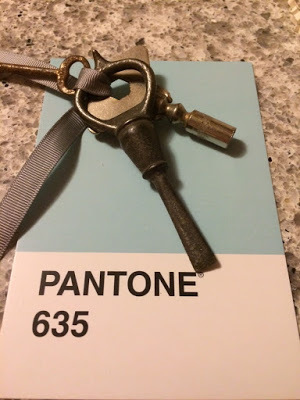
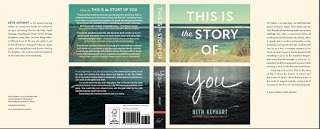 Yesterday the mysterious box arrived with the warning—and I did heed—DO NOT OPEN UNTIL 4/12.
Yesterday the mysterious box arrived with the warning—and I did heed—DO NOT OPEN UNTIL 4/12.But now it's dark and dawn here, and opening is legal, and so I've bladed through, popped the lid, and dug between long strands of confetti to find the words of Taylor Norman, the Chronicle Books editor of enormous wisdom and heart who, following the departure of dear Tamra Tuller, saw This Is the Story of You through to this day, launch day.
I've staggered back. I've shouted Oh My Gosh to the sleepy house. I've tremblingly carried this gift (which includes chocolate, by the way) to my husband, and shakingly exclaimed: "Roller skate keys. Like the kind my Mira wears around her neck as she skates from one end of her barrier island to the other, ahead of that monster storm."
(I did have to explain, just like that, for my husband, bless his magnificent heart, has not read Story.)
And then I said: "The key gives Mira a key-shaped bruise on her chest. The key is real, and symbolic."
And then I said: "That Taylor Norman! Oh my gosh. That Taylor."
Wow. That's what I keep saying as I type these words, my fingers still trembling.
Wow.
To beaches and those who love them. To friendship in the wake of catastrophe. To our Modes, whatever they may be, that carry us from one end of things to the other. World, we give you This Is the Story of You.
To Taylor, I say again: Wow. And thank you.




Published on April 12, 2016 03:30



